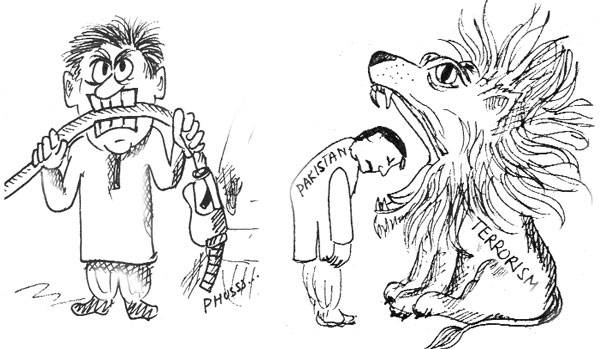
Fuel folly
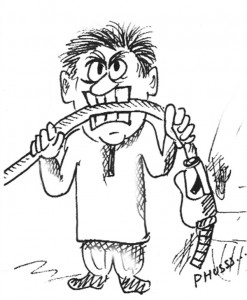
Sir,
As I write these lines, 95 percent of fuel stations in Lahore and 25 percent of those in Karachi are closed. The situation has paralyzed the country, even those dealing with cases of severe emergency. The effects of this crisis are quite visible. Factories have stopped production, trade has come to a standstill, and people cannot go to work. The situation has resulted in a great economic loss.
Our country is already facing great challenges in the energy sector, such as a power crisis and depleting gas resources. We are also dealing with three million Afghan refugees, the blowback of the operation Zarb-e-Azb, and declining law and order. Our economy is in shambles.
Many of us whose lives depend on the use of energy are pointing fingers at the government, assuring it of poor management and poor planning. This situation was not created overnight. Had the Petroleum Ministry made no forecast of the import and consumption of petrol in the country? We should have regulated our imports. There should have been a contingency plan. We should have taken a look at our stocks.
Representatives of Pakistan State Oil (PSO) say they could not predict that people would buy so much petrol. The shortage of fuel is also tied to the fact that the PSO could not purchase enough oil because of a lack of funds, which is being blamed on the circular debt. But knowing full well that in the absence of CNG, consumption of petrol would increase, some steps should have been taken before the crisis emerged.
Minister of Petroleum and Natural Resources Shahid Khaqan Abbasi said in a press conference that due to a 25 percent fall in petrol prices, the demand increased. But the fact is that there was a lack of synchronization among ministries. The Petroleum Ministry has no monitoring mechanism, there was a lack of prudence, and we can see poor planning, or perhaps no planning at all.
Some experts are of the view that it must be deregulated. If that happens, oil companies will set their own price. When the government has a monopoly in a particular sector, its efficiency must be very high. And in case of deregulation, as is the practice the world over, companies are subject to punishment if they make cartels.
In Pakistan, this state monopoly couldn’t be controlled. There remained a lack of coordination among ministries and an absolute ineptness. Regulation of the oil sector was the responsibility of the government. There was a proper ministry for demand forecast. And if stocks were there, then this shortage must not have been created. Some contingency planning must have been done, and the stock position strictly monitored so that it could be released accordingly. An unusual consumption pattern is not an acceptable excuse in this case. If the government regulates something, then provision, distribution and price control is the responsibility of the government.
Shanzeh Iqbal,
Lahore.
World’s bravest nation
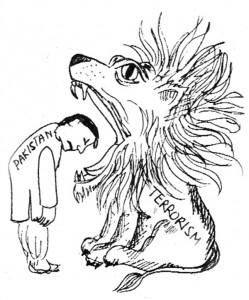
Sir,
Terrorism is not just word. It is a way of thinking that has made the world suffer a lot. There are many countries in the world that are facing this threat. Pakistan is among the nations worst hit by terrorism since 9/11. It ranks third on the Global Terrorism Index (GTI) with 9.37 points out of 10.
In 2014, 60 organizations were declared terrorist by the Government of Pakistan. They include ethnic, sectarian, separatist, and Jihadi groups. At least 432 suicide attacks have occurred in the country since 2001, and over 6,181 people have died and 16,159 injured in them. Over all, more than 54,855 people have been killed in terrorist attacks. Terrorism is a kind of psychological warfare. According to World Health Organization (WHO) terrorist attacks significantly affect the mental health of the people of a country.
Terrorism is also the biggest threat to Pakistan’s progress. The total loss to Pakistani economy in the last 10 years because of terrorism is about $100 billion.
Among the causes of terrorism are decades of poor law and order, and a weak justice system.
The 21st Constitutional Amendment to set up military courts to hear cases of terrorism is a good step towards eliminating this menace. We should not lose hope and should stand united against the scourge of terrorism. Pakistan is among the bravest nations of the world now is the time to prove it.
M Asadullah,
Peshawar.
Terror error

Sir,
The US Secretary of State John Kerry, in his meeting with Pakistan’s premier Nawaz Sharif on January 12, said terrorists were the common enemies of Pakistan and the US. Looked at from a bilateral standpoint, the statement would seem appropriate. However, when looked at from a wider universal perspective, terrorists are the enemies of the entire civilized world and the menace of terrorism has become a universal problem. In view of this fact, both bilateral and collective measures will have to be taken to root out terrorism not only from the countries worst hit by it, such as Pakistan, but from every nook and corner of the world.
Unequivocal condemnation of the Peshawar school carnage by the US President, the UN chief and by leaders from across the globe reflects the strong resolve of the entire world to deal with terrorism with an iron hand. During their one-on-one meeting, Kerry extended condolences of the US government and people over the Peshawar school tragedy and assured Pakistan of his government’s out-and-out support to deal with the issue of terrorism effectively.
The prime minister of Pakistan reciprocated by appreciating President Barack Obama’s message of friendship and cooperation, and expressed his sincere desire for stronger US-Pakistan bilateral relations by stating that friendship with the United States was a vital component of Pakistan’s foreign policy. All said and done, the fact remains that although Pakistan has genuinely gone out of the way to fight the US war on terror, and while doing so it has suffered and continues to suffer huge material and human losses, the support by the US does not, by any means, measure up to the sacrifices made by Pakistan.
It is an indisputable fact that the war on terror has cost Pakistan very dearly both in economic and human terms. It is high time that the US and its allies not only appreciate the huge sacrifices made by Pakistan but also help strengthen its endeavor to fight this long-drawn war successfully and route out terrorism from its soil once and for all.
It is also in the interest of the world at large to extend full moral and tangible support to Pakistan to enable it to obliterate the terrorists and bring an end to terrorism.
M Fazal Elahi,
Islamabad.
Fission first
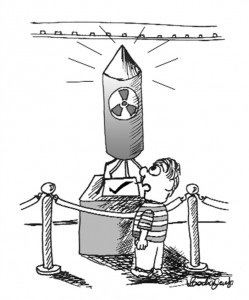
Sir,
The “opportunity costs” of nuclear weapons is a thought provoking concept in Pakistan, North Korea and India, where development of nuclear weapons takes place against a backdrop of prevalent poverty and unmet basic needs. Therefore, some prominent nuclear physicists in Pakistan, such as Dr Pervez Hoodbhoy and Dr AH Nayyar, insist that Pakistan’s development of nuclear weapons is a main source of its economic deprivation and paranoia. For them, the nuclear tests of 1998 was the main reason behind the economic crises that followed. This is exactly a guns versus butter debate — a choice between taking care of people, and the equipment they need to contest and prevail in current and future conflicts.
The debate has gone on for decades. The more the public opinion turns against nuclear weapons, the more various countries seem to want to possess them to demonstrate their power. So we have to discover those benefits which seem to them of such significance that a country prefers to divert a huge sum of money to become and stay a nuclear capable state.
Our rationale for developing nuclear weapons was that Pakistan must be able to ensure its security. After the hefty losses in 1948 and 1965 wars and debacle of 1971, Pakistani leadership comprehended that none of the great powers is going to support Pakistan in time of crisis against India. Nuclear weapons were therefore deemed crucial for the country’s security as well its sovereignty.
Wars are bad for the economy and nuclear deterrence is the best tool to avoid wars. A short conventional war between India and Pakistan would cost Islamabad $350 million per day. One can easily estimate the economic deprivation that will result if Pakistan had to fight another war. In contrast to conventional warfare, nuclear deterrence has made wars between nuclear states rationally non-viable.
The possession of nuclear weapons also serves economic functions. The acquisition of nuclear weapons appears to be associated with long-term decline in conventional military spending. Pakistan’s conventional military expenditure is constantly on decline right after the nuclear tests. Military expenditure as a percentage of GDP in Pakistan was measured at 5.3% in 1998, according to the World Bank. In 2012 that expenditure was 3.13%.
Moreover, the use of nuclear technology for peaceful purposes especially in the energy sector can help Pakistan deal with its power crisis. Pakistan has reached a remarkable milestone in scientific research by becoming an associate member of the European Council for Nuclear Research (CERN). Islamabad can utilize nuclear science and technology for the benefit and improvement of the Pakistani society, and facilitate other countries of the region in peaceful use of nuclear energy. This cooperation will generate revenue to stabilize our economy. The constructive uses of nuclear science are visible in applied sciences, food, agriculture, biotechnology, human health, energy and industry.
Thus, it is a fact that social development should be the first and primary focus of a government, but cutting down on our nuclear budget is not the answer.
Hasan Ehtisham,
Islamabad.
Save our schools
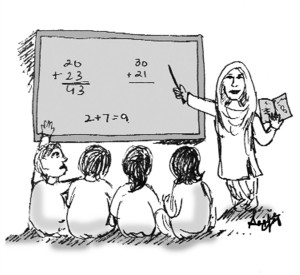
Sir,
Malala Yousafzai, now a well known personality and a remarkable advocate for education all around the world, was an ordinary girl from Swat valley who was shot by Taliban in 2012 when she was returning home on a school bus. She was 15 years old and her only crime was advocating for equal access to education for all children. Her effort to continue school led her to a sacrifice which resulted in a remarkable consensus across the world to ensure safe education for all the children around the globe.
Before and after the brutal attack on Malala, there had been a number of attacks on Pakistani schools by the Taliban. Recently, Taliban gunmen launched on unimaginable attack on the Army Public School in Peshawar, killing 132 children. This was the worst terrorist attack in Pakistan’s history. International reaction to the attack was also widespread.
This is an alarming situation for Pakistan. To be able to go to school in a safe environment is the basic right of every child, and it is the responsibility of the state to ensure the safety of children and schools.
The policies, goals and steps that the government has taken as precautionary measures must be implemented as soon as possible, so that there is a safe and equal access to education for children in Pakistan.
While technical experts and advocates from Save the Children and other groups are engaging in a series of global consultations on post-2015 education indicators, simply counting the number of children who are in schools is not enough.
In Pakistan, education could help change the fortunes of impoverished families, but corruption and pressure by the Taliban and other religious extremists prevent many children from enrolling. Therefore, we must not depend only on the government. Our private individual and collective efforts will also help expand access to and change the attitudes towards education in Pakistan, and these goals are as important as fundamental security measures.
Ayida Anjum,
Lahore.
Respect for religion
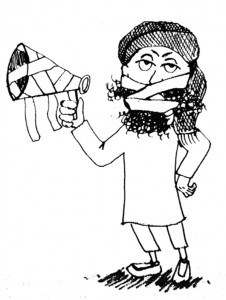
Sir,
A lot is being written regarding the Charlie Hebdo incident in France. Being a Christian, I stand by Pope Francis and everyone else who condemned the attack in Paris but also called for a balance between press freedom and respect for people’s beliefs.
I have always respected Islam and Muslims. I understand that they are angry about the caricatures and I too share that anger. However, I have something to say to my Muslim brothers and sisters. You all feel bad when people criticize your faith, but you do not seem to realize when some of you say things openly criticizing other faiths. Many a times when I became friends with a Muslim, it all went well until they learned that I was a Christian. At once, they offered me to embrace Islam or began a discussion about religion. During such discussions, they confidently declare that my beliefs are sinful, and I will go to hell.
This is also being done publicly. There are many TV programs being aired and a lot of literature being published that openly criticize the Holy Bible and the Christian faith. We could answer all of them by going to court and suing them under Section 295 A, but we do not do so, partly because Muslims often make false accusations of blasphemy against us. As soon as a cleric makes such an announcement based on hearsay, mobs begin to gather. Everybody knows what happens after that. There is no need to recall those painful events of killing Christians, burning their houses, and desecrating churches. In other words, Muslim can criticize other faiths in Pakistan but others are killed on false accusations of blasphemy. But whenever the feelings of Muslims are hurt, Pakistani Christians stand by them and tell the world that Islam is a religion of peace.
It is time for Pakistanis to realize that we should respect each other’s beliefs. If we want to carry out healthy interfaith dialogue, we should create a peaceful, friendly atmosphere of co-existence.
Abid Habib,
Mirpurkhas.

